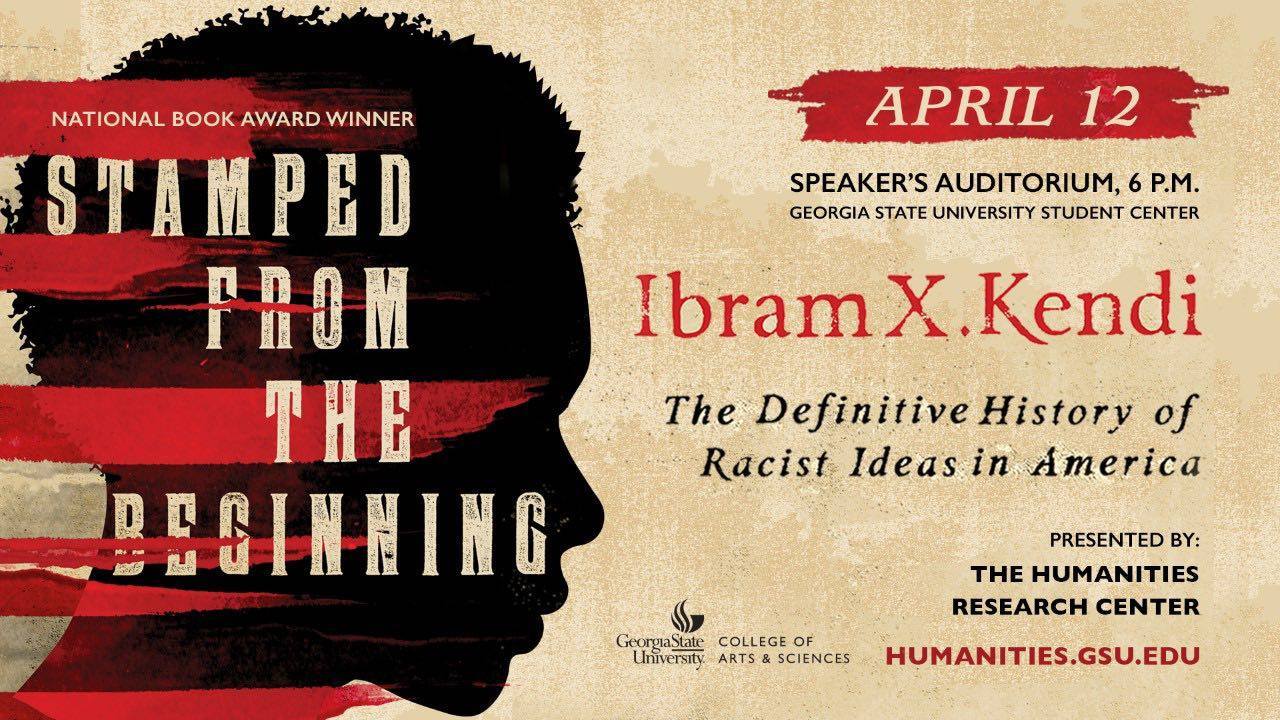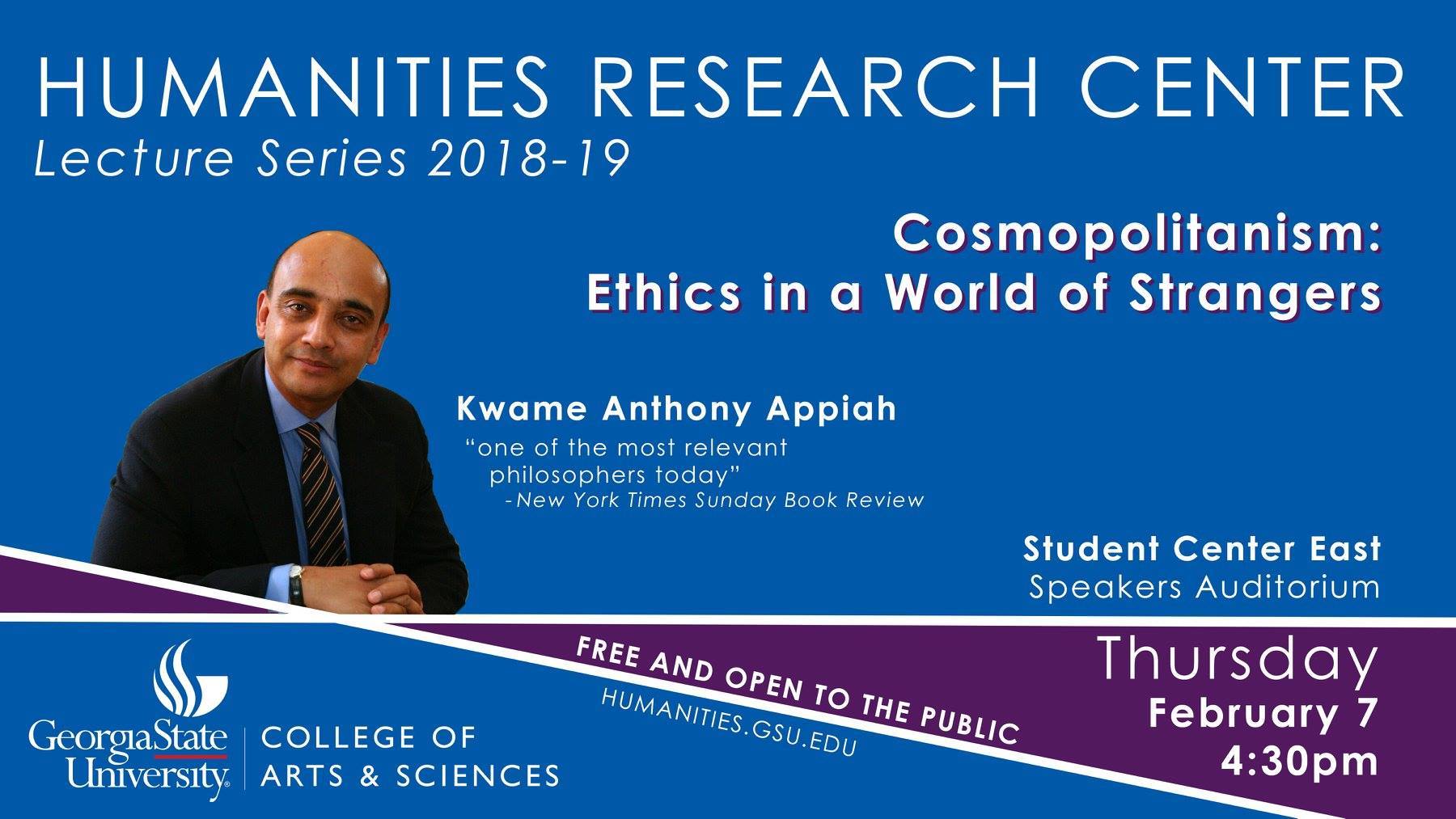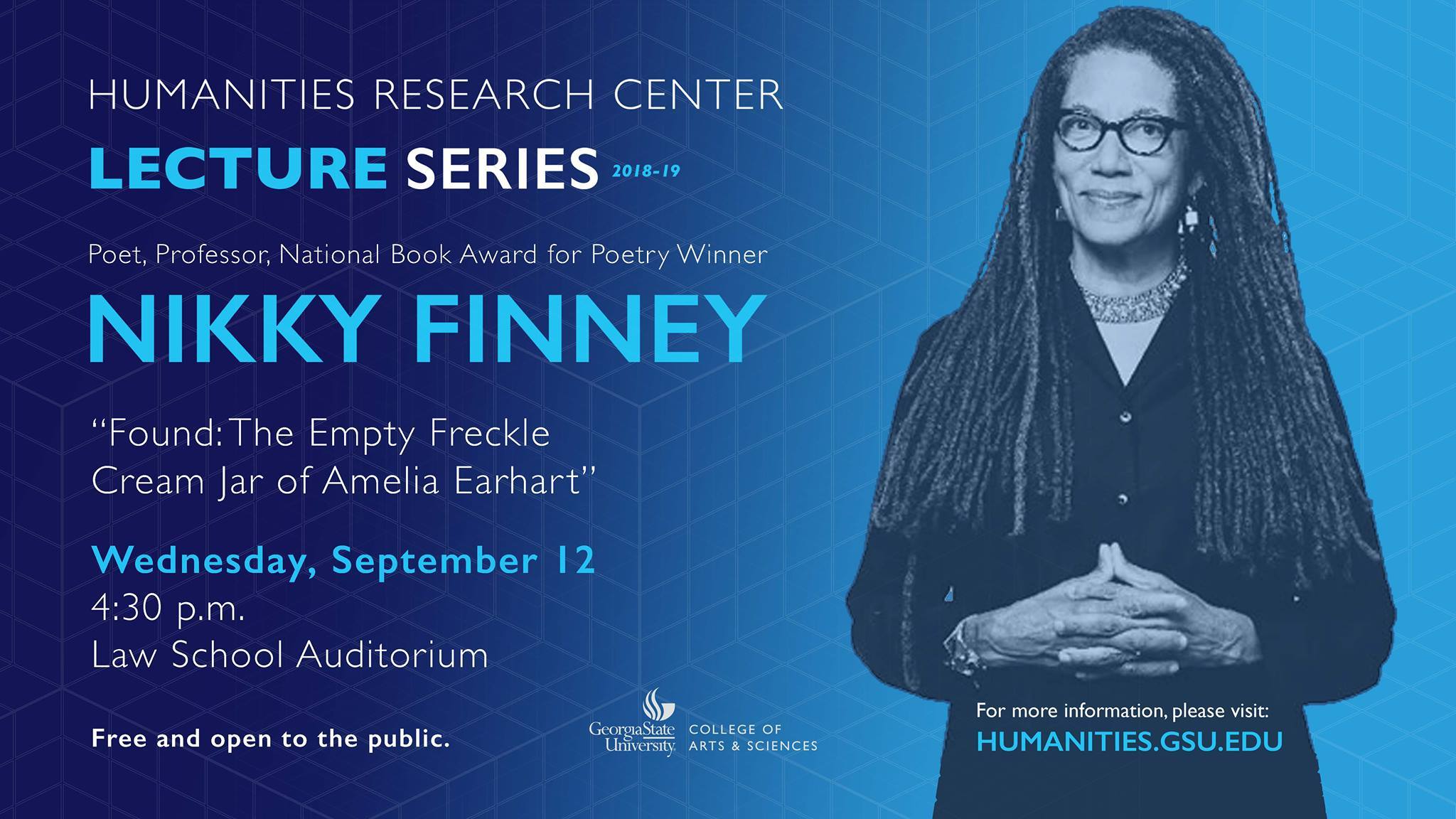Humanities Research Center at Georgia State University
By Denise Z. Davidson, Founding Director and Professor of History
Launched in September 2017, the Humanities Research Center (HRC) at Georgia State University seeks to invigorate the intellectual life of our campus, to highlight the importance of scholarly work in the humanities, and to support humanities faculty in their research. In addition, the Center’s interdisciplinary programming contributes to the larger goal of fostering a stronger sense of community among faculty, students, and staff, as well as drawing the public to our campus. Our efforts thus far have focused on two main initiatives—a speaker series and internal fellowships—as well as a several one-time events and workshops. In terms of space, we have a small suite of offices in a building that houses classrooms on the lower floors and departmental offices on the top floors. The corner suite has four well-equipped offices with windows, an inner reception area, and a storage/break room with a fridge, water cooler, coffee maker, and microwave. After a few months of waiting to get some minor renovations completed, those offices became available in May 2018. With no dedicated space for our events, we hold our meetings in seminar rooms and lecture halls around the campus.
The creation of the Center took place rather abruptly, though there is a long back-story. A new dean, Sara Rosen, took over leadership of the College of Arts and Sciences in 2016. Her previous institution, the University of Kansas, houses the Hall Center for the Humanities, a well-established and successful center that has shaped the intellectual life of that university for decades. A few of us had been trying to launch a humanities center at Georgia State during the previous few years, but our efforts to gain support from the central administration had been unsuccessful. When Dean Rosen arrived and heard about these earlier attempts, she suggested creating a center as a College initiative. The previous dean had received a one-time gift from the Carlos Foundation to launch a humanities center; that combined with some support from the College, provided the initial funds to begin our programming and to set up our space. As the Director, I do most of the work of running the Center with support and guidance from the Dean’s Office and with assistance from a faculty advisory board comprised of humanities faculty from within and beyond the College. I also have a graduate student assistant who helps with maintaining our email lists, updating our website (humanities.gsu.edu), and advertising and running our events.
I spent an academic year at the National Humanities Center (NHC) in North Carolina several years ago, and that experience provided a model for what we have done here. At the NHC, fellows receive offices and are expected to eat lunch together every day. Otherwise, they have no obligations, though many create informal reading and writing groups. Our fellows program, which is open to Georgia State faculty when they have a semester of research leave, provides space where the fellows can work with fewer interruptions than in their departmental offices and a change in routine and venue that can help inspire productivity. The fellows also receive a small stipend and the opportunity to share work in progress at an interdisciplinary workshop open to faculty and invited graduate students, and we occasionally gather for lunch or coffee to discuss our work more informally. Unfortunately, we do not yet have the funds to offer course releases. Thus, one problem we have encountered is that we have a relatively small pool of applicants each semester. Luckily, we have had at least four apply each semester. We have had three cohorts of fellows thus far, and all seemed to appreciate and benefit from the opportunity.
Georgia State is a large, public, urban university with an extremely diverse student body, many of whom are first-generation students and Pell-eligible, meaning that they come from families with very limited means. There has been little in the way of a traditional campus feel to Georgia State, though that is changing quickly as more dorms have been built and new construction has been designed to encourage people to spend more time in common spaces. The university has built a reputation as an innovative institution, particularly in its impressive record of dramatically increasing undergraduate retention and graduation rates. The university’s external funding for research has also increased very quickly over the last ten years or so. There is no doubt that Georgia State is a dynamic, innovative institution that is doing great things for its students and where some areas of research have expanded quickly as well. One drawback of such a large, diverse institution is that there has been little in the way of intellectual community, with most faculty siloed into their departments, schools and institutes.
One of the arguments for launching a humanities center was to foster a greater sense of community across the disciplines. In addition, with external research grants as the primary internal metric for measuring research productivity, the humanities and humanistic social sciences have lost prestige—and resources—at the university with faculty morale dropping as a consequence. We thus defined the mission of the Humanities Research Center as “to improve the visibility of important work being done by humanities scholars in various departments at Georgia State and by humanists more generally. To accomplish that mission the HRC focuses on two main goals: (1) organizing and hosting events that will bring together faculty, staff, and students as well as the general public to participate in conversations about topics of broad public interest and debate; and (2) encouraging and assisting humanities faculty and graduate students in their professional goals.”

Our efforts to work toward these goals have been quite successful. Our inaugural public event was a lecture by Ibram X. Kendi, whose book Stamped from the Beginning: The Definitive History of Racist Ideas in America, won the National Book Award in 2016. His April 2018 lecture filled most of the spots in our largest auditorium, which seats 430 people. During the 2018-19 academic year, we held three public lectures: the poet Nikky Finney spoke in September, the film and media studies scholar Noah Isenberg visited in November, and the philosopher Kwame Anthony Appiah came in February. The Center also co-sponsored two other large public lectures: biologist and environmental studies professor David George Haskell and visual studies scholar Jasmine Cobb. Because our budget is rather tight and we have little staff support for the Center, in each case we developed partnerships with other departments and entities on campus to help with logistics and in some cases the funding. Appiah’s visit, for example, was co-sponsored by the Law School and the Department of Philosophy and professor Cobb’s visit was covered by a Mellon Grant that Georgia State recently received which is focused on creating a pipeline program for undergraduate students interested in pursuing PhDs in the humanities. Each speaker has given both a large public lecture and led a smaller seminar or workshop for invited faculty and graduate students, thus contributing to the goal of creating opportunities for interdisciplinary conversations and community-building.

The Fellows workshops have been the main other venue for encouraging such conversations. Every semester, we run four workshops where the fellows present a work in progress in the form of a pre-circulated paper. The fellows then receive feedback and discuss the work over a brownbag lunch, with the HRC providing some sweets and beverages. Both the fellows—twelve so far—and the participants at these events—generally around 15 at each workshop—have expressed positive, even glowing, reactions. The fellows benefit from the feedback and suggestions they receive, and the participants appreciate the opportunity to engage on an intellectual level with their colleagues. We begin each session with brief introductions, as there are almost always people in the room who have never met. Other opportunities for humanities faculty to engage in conversations have been one-time events, including a book launch celebration, a grant-writing workshop, and seminars led by our visiting speakers.

Those seminars have been extremely rewarding experiences. I can think of one moment during the seminar led by Nikky Finney that stayed with me. The theme was “On Being a Poet of One’s Time” and there were about twenty-five people in the room, roughly half faculty and half students, many of whom had just read her collection of poems, Head Off and Split. Nikky began the discussion by having everyone listen to a five-minute excerpt from a speech by James Baldwin and asking that we write down one or two lines from the speech that stuck with us. The ensuing discussion took us in many different directions. One of the students brought up a passage from the poem “Head Off and Split,” and provided her analysis of its meaning. Nikky listened, and after a pause said (to paraphrase): “That is so right, and you are the first person I have ever heard put it that way. You really got it.” The student was beaming with pride, and I could imagine that experience having a huge impact on her and her level of confidence moving forward.
In terms of our challenges, the most obvious one is funding. We received start-up funds, but now must find sustainable, long-term funding so that we can continue our current programming and hopefully expand it. A small line of state funds, which dates from an earlier attempt to create a humanities center many years ago, provides some reliable support, but with tight restrictions on its uses. With a record of success built up in our first 18 months of existence, we hope that local Foundations and corporations may find it appealing to sponsor the lecture series. I have a good relationship with the College Development office, and will be working with them closely to find donors and hopefully to build a small endowment that will permit us to grow and thus attract other donors over time. Should we be successful in those efforts, I would like to be able to offer faculty course buyouts and thus increase the potential pool of applicants for the spots as HRC Fellows. Ideally, we’d like to get to the point where it would be possible to hire a full-time staff person to handle and communication, as well as event planning.
A second related challenge relates to getting the word out about our initiatives. The College’s Office of Communication has been helpful, especially during the past year or so when a new Director of Communications came on board and has been working closely with me to publicize our events. As mentioned earlier, my student assistant maintains email lists of humanities faculty at Georgia State that we use to advertise the internal workshops and lists of department chairs and faculty other institutions that we use to advertise the public events. On two occasions, our visiting speakers agreed to be interviewed by our local NPR station, which has a daily program focused on culture and the arts. Those interviews drew large numbers of attendees to the lectures. It’s not easy to spread the word about events, and people often tell me that they missed events because they had not heard about them. Again, with more funding, we could have an advertising budget and create more printed materials to distribute around the city as well as to do more to advertise our events on local media.
Overall, the creation of the Humanities Research Center has been met with great enthusiasm among the faculty and students at Georgia State. On more than one occasion, when the creation of the center and later our initial events were announced at College Faculty meetings and other gatherings, the attendees broke out into applause. There is a real thirst for building an intellectual community and addressing the low morale visible among faculty who are not in the grant-generating fields. Several colleagues have mentioned after a workshop or seminar that it was the first time they engaged intellectually with colleagues in other departments on matters related to research. Our events have, for the most part, been well attended, though sometimes fewer faculty attend than I would like. It takes time for people to change their habits, and at Georgia State, many faculty are only on campus when they are teaching. With each successful event, more people are putting the HRC on their radar screen and seeking information on future programming. Now we must work to maintain and build momentum from our early successes.